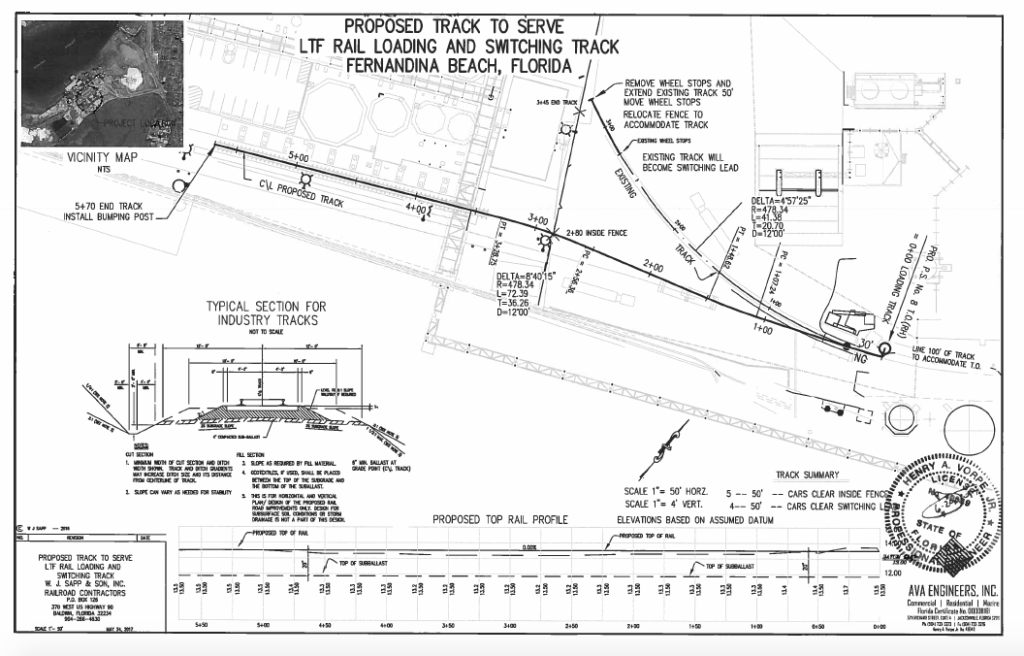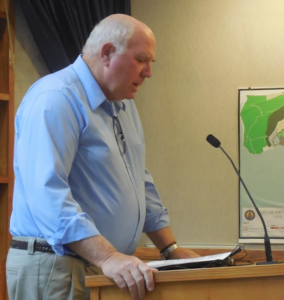Submitted by Suanne Z. Thamm
Reporter – News Analyst
November 26, 2017 4:52 p.m.
At their November 21, 2017 Regular Meeting, Fernandina Beach City Commissioners (FBCC) unanimously approved three separate resolutions that will implement terms of an agreement reached with Rayonier Performance Fibers LLC and LignoTech Florida in late 2016. The agreement set out the conditions for development of a lignin processing facility located on property owned by Rayonier Advanced Materials at 6 Gum Street in Fernandina Beach, FL. The three resolutions enable Rayonier Performance Fibers and LignoTech to take advantage of a state grant in the amount of $841,667 for construction of a rail spur and transfer switches to serve the new LignoTech Florida manufacturing plant.

Because the Florida Department of Transportation’s Economic Development Transportation Fund (EDTF) Grant program requires that the monies be disbursed to a local government on behalf of the project, Rayonier Performance Fibers’ ownership of the approximately one quarter acre of land required for the rail spur and transfer switches had to be transferred to the City of Fernandina Beach (Resolution 2017-164). Both the property owner (Rayonier Performance Fibers) and the mill operator (Rayonier Advanced Materials) have indemnified the City for all past, present and future environmental contamination in the Deed of Dedication that will get recorded in the public records of Nassau County, Florida.
The statement indemnifying the city was added in lieu of an environmental study, a possibility raised by the FBCC at an earlier meeting.
The City Commission accepted the Deed of Dedication from Rayonier Performance Fibers, LLC as part of accepting the Florida Department of Transportation Economic Development Fund Grant for construction of a rail spur. FDOT requires that land be dedicated to the City since the grant monies will be paid to the City and distributed to LignoTech for construction.
The City has been working with LignoTech Florida, LLC and Rayonier Performance Fibers, LLC to receive grant monies for construction of a rail spur and transfer switches to serve the LignoTech manufacturing plant. The rail spur, transfer switches and any other improvements on City property through this EDTF grant shall be maintained by LignoTech Florida, LLC and Rayonier Performance Fibers, LLC at no cost to the City as memorialized in the License and Maintenance Agreement that will be recorded in the public records of Nassau County. This requirement was memorialized in City Resolution 2017-165.
In October 2016, the City was awarded an Economic Development Transportation Grant in the amount of $841,667. Rayonier and LignoTech are assuming responsibility for design and construction of the project, and the City will administer and disburse the grant monies to Rayonier through progress payments (Resolution 2017-166). The City has no liability or financial obligations for the project (rail spur and associated improvements) upon completion.
The FBCC initially discussed these resolutions at their Regular Meeting on October 17, 2017. Following public input that raised concerns over environmental cleanup liability, the FBCC postponed action until City Attorney Tammi Bach could further investigate and discuss concerns with Rayonier Performance Fibers representatives. When the resolutions returned for consideration at the November 21 Regular Meeting, language for the Deed Dedication had been changed to reflect the parties’ intent that both the property owner and the mill operator would indemnify the city for “all past, present and future environmental contamination.” Rayonier Performance Fibers and Rayonier Advanced Materials acknowledged that their entire property has been an industrial site for 80 years. Bach added that the land in question is approximately 8,000 square feet out of a total property of 260 acres.
Public comment
This modification, however, did not satisfy Ronald J. “Chip” Ross, Frank Santry, and Lynn Williams who continued to oppose passage of the Resolutions based upon their beliefs that the agreements were unfair to future residents of the city who might be responsible for so-called Super Fund cleanup should the mills decide to sell the property.

Ross continued to question why an environmental study had not been done. He also questioned the impact on the city’s insurance policy of “accepting a property that is a potential brownfield site.” While acknowledging that there is a low risk to the city, he questioned why Rayonier would not deed the parcel, which is fully contained in the Rayonier land, to the county or the state. He questioned why LignoTech was not a signatory. “What are the specific benefits to the City of Fernandina Beach for accepting any risk at all from this land transfer?” he asked. “What are the citizens getting out of it?”
Bach replied that LignoTech is not a property owner at this time and added that this is not an insurable risk. She said that even Ross acknowledged that the risk is very small – or as she termed it, “remote.” She reminded commissioners that they had been working to secure this project for more than a year because it would result in benefit to the community in their opinion. She emphasized that while she maintained that risk was remote, she had never said there was no risk at all.

Frank Santry continued to insist that the only way the city can eliminate Super Fund liability is via an environmental study. He said that Rayonier refused to perform the study because they did not believe they could get a clean bill. “The only prudent assumption for you to make tonight is that this is a contaminated site for which the city as owner will be required to clean up in the future,” he said. “I think it’s foolish of you to approve this.”
Lynn Williams agreed with Santry. He seemed to suggest that because the city does not know how long the mill’s water supply will last, that could cause the operation to shut down and force a sale of the land. “At the end of the day,” he said, “they are responsible to their stockholders, not city residents.” He suggested that Rayonier be required to put $5M into a bond to be used for the city’s environmental clean up of the 8,000 square feet of land, should the property ever be for sale. “Get some money, and get it now,” he said.
Commission discussion

Vice Mayor Len Kreger said that the speakers had offered food for thought. However, given the small size of the parcel that would belong to the city and the remoteness of the scenarios playing out as the speakers suggested, he expressed a desire to move forward with the project. While acknowledging that he is not a lawyer, Kreger said that as he read the various laws, he believed the city’s responsibility would be slight, “IF the land is designated as brownfields, which it is not [currently].” Kreger then moved approval.
Commissioner Tim Poynter said he appreciated the public comments, “But life is full of risks. You have certain risks, and you have very, very minimal risks. … We need to move forward with this.” He seconded Kreger’s motion.
 Commissioner Roy Smith asked what would happen if the city voted down the motions. Bach replied that the city would not get the state grant to assist with the project. She added that the property transfer was part of the grant agreement. She said that the city agreed with the parties that they would do this last year. If the city would renege, she did not believe there would be legal ramifications for the city. Smith said he believed the parties would continue with the project even without the grant.
Commissioner Roy Smith asked what would happen if the city voted down the motions. Bach replied that the city would not get the state grant to assist with the project. She added that the property transfer was part of the grant agreement. She said that the city agreed with the parties that they would do this last year. If the city would renege, she did not believe there would be legal ramifications for the city. Smith said he believed the parties would continue with the project even without the grant.
 Mayor Robin Lentz interjected that she was aware of the actions the city would be required to take as well as the risk. “At the end of the day,” she said, “if that mill closes, that 8,000 square feet would be the lease of our worries. [The closing] would be so detrimental to our economy, we’d become like St. Marys when their mill closed. Fifteen years later there is still nothing to replace it. That’s why I’ll support this.”
Mayor Robin Lentz interjected that she was aware of the actions the city would be required to take as well as the risk. “At the end of the day,” she said, “if that mill closes, that 8,000 square feet would be the lease of our worries. [The closing] would be so detrimental to our economy, we’d become like St. Marys when their mill closed. Fifteen years later there is still nothing to replace it. That’s why I’ll support this.”
Commissioner John Miller spoke last, addressing Ross’ question on what benefit the agreement brings to the community. “While I don’t presume to speak for the Commission, I think we all know well and good what benefit the mill is to this community. Anything we can do to help the mills within reason, I think it’s important we do so.”
All three Resolutions passed on 5-0 votes.
 Editor’s Note: Suanne Z. Thamm is a native of Chautauqua County, NY, who moved to Fernandina Beach from Alexandria,VA, in 1994. As a long time city resident and city watcher, she provides interesting insight into the many issues that impact our city. We are grateful for Suanne’s many contributions to the Fernandina Observer.
Editor’s Note: Suanne Z. Thamm is a native of Chautauqua County, NY, who moved to Fernandina Beach from Alexandria,VA, in 1994. As a long time city resident and city watcher, she provides interesting insight into the many issues that impact our city. We are grateful for Suanne’s many contributions to the Fernandina Observer.
